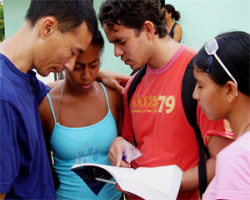Summer is approaching quickly, which means the busy season is here for most international ministry coordinators. In addition to arranging travel, scheduling in-country programs, and the myriad other responsibilities that go with leading teams, there is the issue of recruiting. If you are like many team leaders, mobilizing enough people for your trips is a struggle. It is tough getting people to volunteer half way around the world. You can overcome this hurdle if you utilize your current team as a recruiting force for future trips. Here are five tips to get you started.
1. Expand your prayer team. Besides the obvious benefits of more prayer, each prayer warrior becomes a prospective team member. As these people pray for your work, their hearts are stirred for your mission. Grow your prayer team by asking people to sign a prayer commitment. It may be a piece of paper distributed by team members, or it may be a form on a website, but signing encourages follow-through. Plus, it gives you the opportunity to capture names and email addresses. These should be some of the first people you contact for your next trip.
2. Engage your donors. Just like your prayer team, those who financially support your team members have a connection to your work. They demonstrated interest by parting with their cash. Encourage these folks not only to give, but actually go. For years, one man supported his wife and children as they did missions work. He said, “I pray and pay so they can go.” Finally, he realized as good as it was to help his family, he was robbing himself of a greater blessing by not going with them. He didn’t think going was for him, but after one trip, that all changed!
3. Capture stories. Nothing raises vision or mobilizes people more than stories. Statistics may impact some, but stories move everyone. You can talk about the millions of people in spiritual darkness, the high percentage of people without clean drinking water, or the mortality rate among your targeted people group, but those numbers don’t connect like a story. Find a personal story that illustrates the need and shows the benefit of your work. Stories are powerful tools for casting vision. Here are some ideas to help you capture more stories.
First, at the end of the trip, ask each team member to write down their most memorable moment. Half joking, I told my teams they had to give me their “most memorable” before I would give them their airplane ticket home. If you wait until after the team gets back to collect these, you will be lucky to get any. Get the stories on your way to the airport or even during the flight home, but get those stories!
Besides written testimonies, you may also want to consider sending a video camera along with each group during your trip so they can record events as they happen. Also, if you will have Internet access overseas, set up a blog site for team members to post articles and photos during the trip. You not only will capture stories, but you will cast vision to those back home following your progress. Make it your goal to capture as many stories as possible, then pick out the best three or four and use them to report on your trip.
4. Train your team to communicate effectively. Most people do not know how to give an effective presentation about their trip. One way to improve this is by providing an outline that can be used in formal presentations and informal gatherings. Here’s a suggested outline: 1) My most memorable moment. 2) What I saw God do in others. 3) What I saw God do in me.
Also, encourage your team to focus on the main facts of a story rather than minor details. “We left early in the morning for the remote village” is much better than “After walking quickly to our beige-colored van, the one with the crack in the rear window, driven by Ahmad, the second cousin of our translator’s sister’s aunt, we went to a remote village in the early morning hours.” The latter may work in a novel, but it is hard to follow in an oral presentation.
In addition, teach your team not to “dump” on people when asked about their trip. Most people who ask about a trip expect a short, concise response, not a 15-minute rambling about the trip’s minutest details! Teach your team to create a 60 second summary response. If the person asking about the trip is interested in more, the team member can go into depth using their “outline.” By effectively communicating their experiences, your team will multiply your recruiting efforts.
5. Keep the fires burning. Even after the trip is over, do as much as you can to keep the experience in front of your team, their supporters, and anyone else who is interested. This would include sending periodical emails or newsletters updating everyone on progress made on the field since you left. Also, host a picture party after you get home. Give your team the opportunity to share photos and swap digital memory sticks, but be sure to invite other people to this, as well. In addition, you may want to consider monthly or quarterly prayer meetings to keep the missions flames burning until it is time to go again.
All of these tips will help you cast vision to potential team participants. Vision is what propels people to move out of their comfort zones and tackle new opportunities. As you develop your prayer team, engage your donors, capture stories, improve communications, and find ways to stroke the flames of ministry passion, you cast vision. As you do, you will find that team recruitment comes much more easily.
Frank Banfill writes on behalf of Ministry Travel, an agency with the mission of providing the best service and prices to their missionary and ministry clients.




